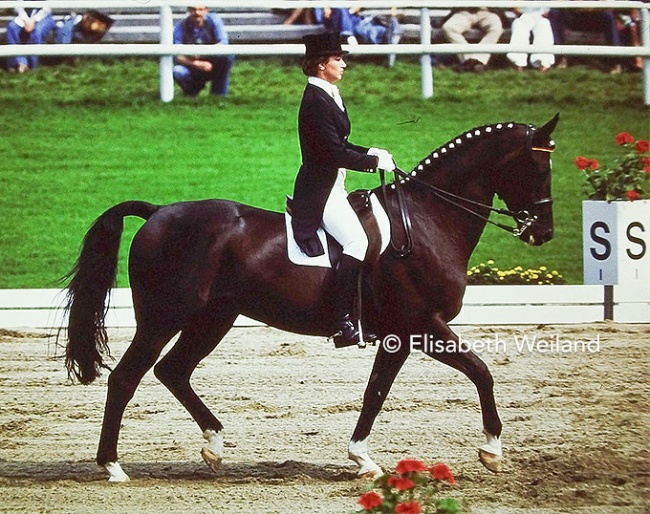
-- Text by Silke Rottermann for Eurodressage - Photos © Elisabeth Weiland / Hugo Czerny
Gabriela Grillo, German Olympic team champion and Deputy Chairman of the Wilhelm Grillo trading company, died last weekend aged 71. Grillo was not only one of Germany’s most successful dressage riders from the mid 1970s to the mid 1980s, she was also a pioneer in freestyle riding as well as a successful entrepreneur.
For the Love of Horses
Gabriela Grillo was born 19 August 1953 as daughter to Herbert and Marita Grillo, who lived in Duisburg in West Germany.
Like so many girls she took an early interest in horses, starting to ride under the tutelage of Otto Fuhrmann at the Riding Club Uhlenhorst in Mülheim / Ruhr. As a teenager she began training with the legendary dressage trainer Walther "Bubi" Günther. Thanks to her dedication, discipline and least but not last her love for horses, Grillo obtained her first successes at a comparatively young age, though in a time when the current youth divisions did not yet exist internationally.
In a time when German dressage was dominated by men and women in their 'best years,' Gabi Grillo entered the highest level at the beginning 1970s with the Swedish bred gelding Honduras at the tender age of 20. In September 1972 she got her first taste of the Olympics and rode in front of well over 70,0000 spectators in the closing ceremony of the Munich Olympics.
German School Quadrille
On home soil and 42 years after its inauguration Grillo was by far the youngest of the 12 riders who revived the legendary German School Quadrille. Created by Felix Bürkner (1883-1957) in 1940, the Quadrille featured the best 12 German dressage riders to who Grillo and Honduras already belonged, showed this fascinating interplay at Grand Prix level.
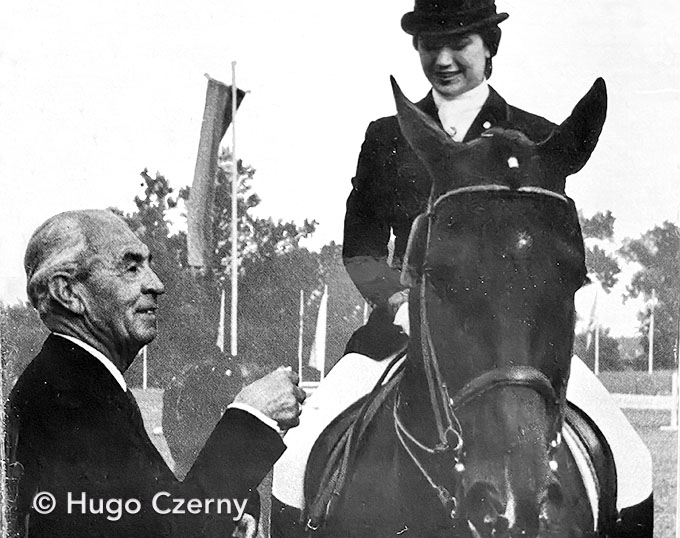
at a show in Bavaria in 1972
(Photo © Hugo Czerny)
After having done her A-levels at a Gymnasium in Duisburg and a year before the Munich Olympics, she started studying music, drama art and German philology in Cologne and with time took a particular interest in the so-called horse ballet.
In spring 1973 Grillo’s trainer ‚Bubi‘ Günther died after heart surgery and the then 20-year-old started to train with Albert Stecken (1915-2011). The General Mayor of the German Bundeswehr was German national dressage team trainner between 1971 and 1974 and became Grillo’s trainer in the years to come, continuing to provide her the classical training which Bubi Günther had laid the foundations of in the years before. It was well reflected in her riding style and in all her horses.
Ultimo
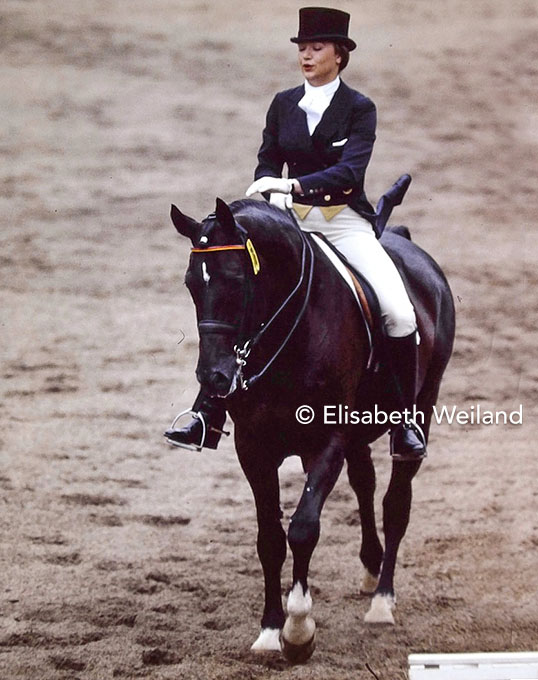
At the Dortmund indoor show in March 1974 Harry Boldt brought a shiny black Trakehner gelding for training purposes. Grillo saw the horse and fell head over heels in love with this typical representative of the noble breed. A few months later the now legendary partnership of a 21-year-young lady and the then 9-year-old gelding started.
While Honduras allowed Grillo to gain ring practice at the highest level and made her a name as a talented upcoming young rider, it was Ultimo who allowed her an almost meteoric rise on international level from 1976 onwards.
Ultimo was sired by the Humboldt son Heros out of a dam by the absolutely legendary original Trakehner Totilas. Born in 1965, Ultimo had a rough start in life suffering from foal paralysis (navel-septic arthritis), but he recovered to face another blow when his dam had to be put down while he was still suckling, making the handsome gelding a bottle-fed foal.
Gabriela Grillo would later say that some of her horse’s charming quirks had their origin in this kind of upbringing, but it was she who allowed Ultimo to keep his original character.
International Career
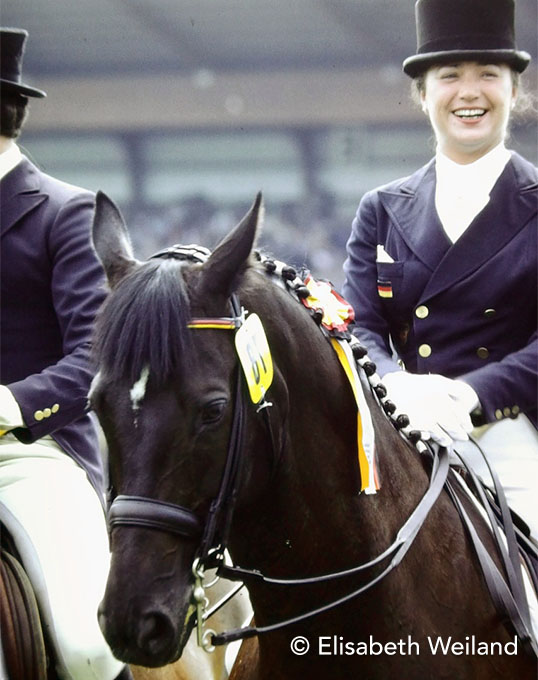
most successful, but also her heart horse
Only 8 months later her and Ultimo’s name were firmly on the list of only three riders chosen to represent Germany at the 21st Olympic Games in Canada after riding into the limelight at the shows in Germany, which were leading up to Montréal. The 23-year-old Grillo was the youngest ever rider on a German dressage team at that time, with her team members Dr. Reiner Klimke and Harry Boldt both being more than double her age. She would later mention in Uwe Peppenhorst’s Reiner Klimke biography „Reiner Klimke: Erinnerungen an einen großen Reiter und Menschen" that it had been great luck for her to have these two greats at her side when she debuted on the team.
In Montréal Grillo went in as third team rider and solidified a never endangered German Olympic team gold, even though she had to look for her gold medal as the strap of hers as well as a U.S. team rider's medal broke during the lap of honour and the medals got lost in the sandy footing. They had to rake the arena to retrieve the two medals. Individually she and Ultimo placed 4th.
Grillo became a mainstay on the German team from 1976 till 1982, with the exception of 1980 when she was only an individual rider at the Alternative Olympic Games in Goodwood. Ultimo carried her to two European team gold medals (1977 St. Gall and 1979 Aarhus) and one at the 1978 World Championships in Goodwood. They added two German championship titles in 1977 and 1979 to their tally and also won the then highly prestigious German Dressage Derby in Hamburg twice.
Galapagos and Grandison
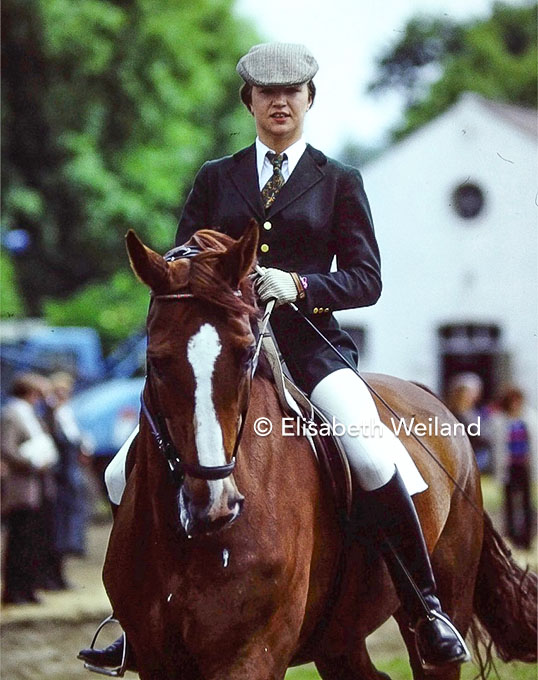
With him she seamlessly continued to ride on the German team, which won team gold at the 1981 European championships in Laxenburg (Austria) and the 1982 World Championships in Lausanne. Galapagos also enabled Gabriela Grillo her only individual medal, European bronze in 1981.
After Galapagos’ premature retirement Grillo struggled to find a successor of the same outstanding quality, but another Grande son, the strong dark-brown gelding Grandison and later the pretty Hanoverian liver-chestnut gelding Losander (by LeutnantI) kept her in the enlarged top group of German riders.
Unifying Equestrian Art and Music
In the 1970s when freestyle riding was in its infancy, Gabriela Grillo was ahead of her time in that branch of dressage and almost always lead the lap of honour when Ultimo, or later Galapagos, competed in a freestyle, held as an extra class at international championships.
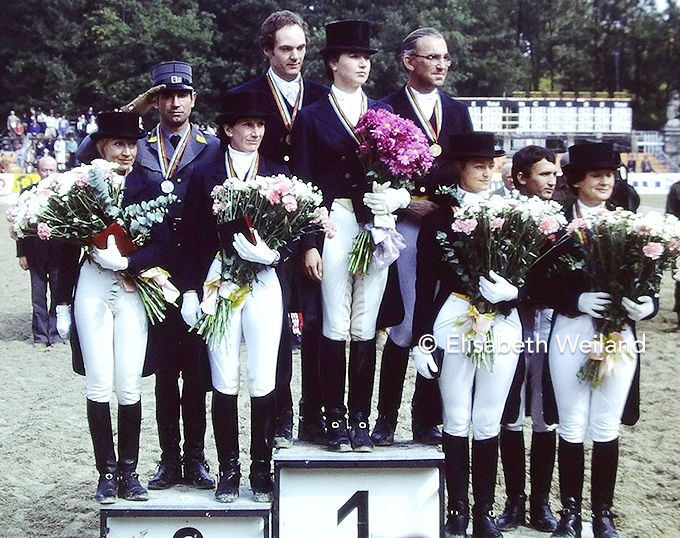
at international championships 6 times between
1976 and 1982, here at the 1981 Europeans in
Austria.
A rider who often shared the podium with Grillo was Swiss Olympic champion Christine Stückelberger. She told Eurodressage while reminiscing on their life-long friendship, "the many happy hours Gabi and I spent at her house, listening to different music and discussing which would fit for our freestyles. It was a friendship that lasted for almost 50 years and for which I am extremely grateful for. Gabi’s death is a huge loss as she was a wonderful rider and a beautiful person inside out."
Outstanding Engagement
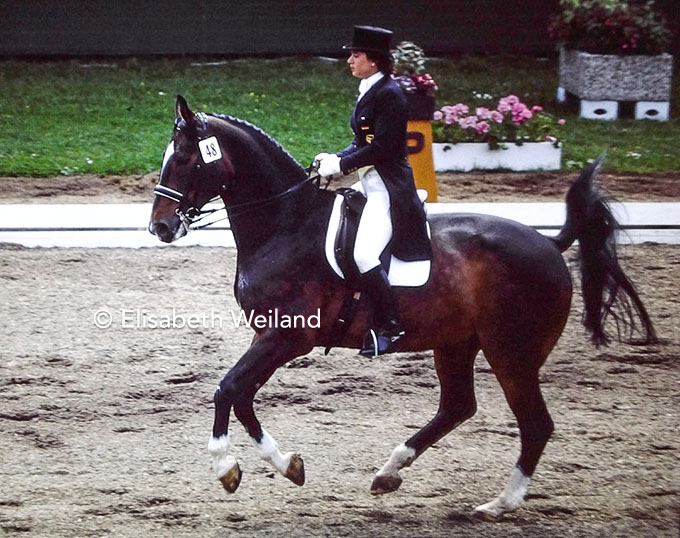
Although it was her family’s company "Grillo Werke" (a production company of products in zinc & sulphur) which would determine her life as of 1993, horses never left her life and remained her great passion. From 1993 till 2021 she was an executive partner in the company and chairman of the supervisory board.
The Mülheim based entrepreneur not only had a big heart for horses and her sport, but supported a whole variety of charities in many different spheres of life, may it be education, culture or sport. She stayed in touch with her beloved dressage sport by supporting the talent pool of the Stiftung Deutscher Pferdesport, taking over the funding partnership of young talents, among them German Grand Prix riders Bianca Nowag and Claire-Luise Averkorn. For her outstanding social engagement Gabriela Grillo was awarded the highest honour of Germany, the Federal Cross of Merit first class, in 2021.
For almost twenty years Grillo annually returned to the CHIO Aachen, the Mekka of equestrian sports, together with Christine Stückelberger, watching the dressage classes. Both ladies co-authored the history of that show as regular competitors.
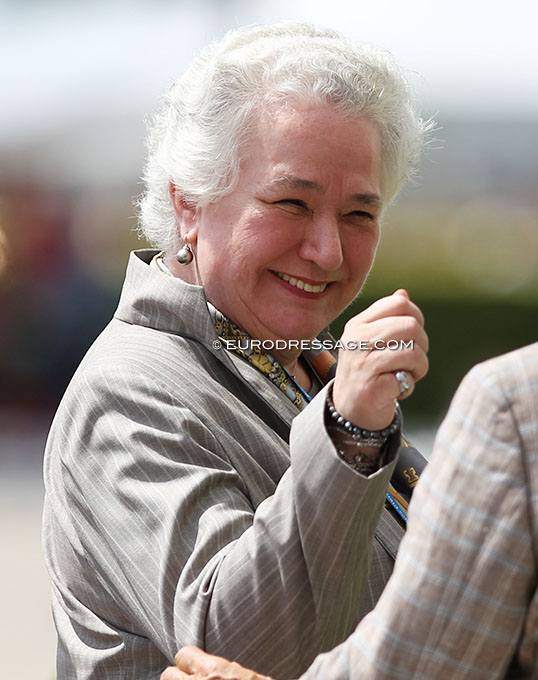
"the responsibilities of the development of dressage are in the hands of the people which are involved in horse sports. They have to be aware of and maintain the precious traditions of equestrianism while also ensure the right way towards the future. In this manner the riding culture of the future will be connected with that of the past.“
Gabriela Grillo certainly was aware of this responsibility and lived up to it.
-- Text by Silke Rottermann for Eurodressage - Photos © Elisabeth Weiland / Hugo Czerny / Astrid Appels
Related Links
1978 World Championships in Goodwood - Dressage in the Park
An Affair to Remember: the 1980 Olympic Games
1982 World Championships Lausanne — Again Dr. Reiner Klimke
Woyzeck: A Star Who Was at Peace with Himself
Albert Stecken Passed Away
The Freestyle: The Perfect Symbiosis of Horse, Rider and Music
Stephan Krawczyk: Dressage to the Beat
History of the European Championships